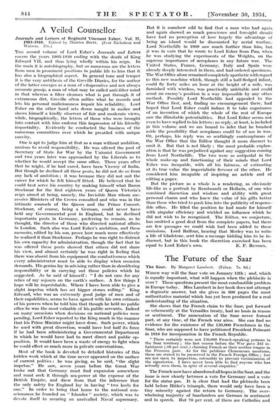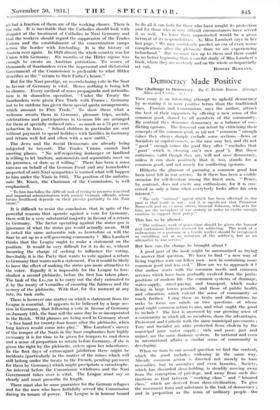The Future of the Saar
The Saar. By Margaret Lambert. (Faber. 7s. exl.) WHICH way will the Saar vote on January 13th ; and, which is equally important, what will happen when the plebiscite is over ? These questions present the most combustible problem in Europe today. Miss Lambert in her book does not attempt a dogmatic answer, but she gives in 300 pages the most authoritative material which has 3-et been produced for a real understanding of the situation.
She shows that the French claim to the Saar, put forward so vehemently at the Versailles treaty, had no basis in reason or sentiment. The annexation of the ..Saar.. never formed part, at any time, of the French war aims. She can find no evidence for, the existence of the 150,000 Frenchmen in the Saar, who are supposed to have petitioned President Poineare in 1918 for incorporation in the French Republic.
"There certainly were not 150,000 French-speaking persons in the Saar, territory ; the last census before the War gave 342 in- habitants (.06 per cent.) claiming French as their mother tongue in the Prussian part. As for the petitions Clemenceau mentions. these are stated to be preserved in the French Foreign Office ; but are not open to inspection, ostensibly to prevent victimization of the signatories. I have, never been able to find anyone who has. actually seen them, in spite of several enquiries."
The French now have abandoned all hopes in the Saar, and the issue is now clearly between a vote for Germany and a vote for the status quo. It is clear that had the plebiscite been
held before Hitler's triumph, there would only have been a tiny minority against the return to Germany. The over- whelming majority of 'Saarlanders are German in sentiment and in speech. But 70 per cent, of them are Catholics and all but a fraction of them are of the working classes. There is the rub. It is inevitable that the Catholics should look with disquiet at the treatment of Catholics in Nazi Germany and that the workers should regard the suppression of the Trades Unions and the establishment of the concentration camps across the border with foreboding. It is the history of Austria over again. In 1929 almost the whole country was for Union with Germany. Six months of the Hitler regime was enough to create an . Austrian patriotism. To scores of thousands of Saarlanders even the impersonal and dictatorial Government of the Commission is preferable to what Hitler describes as the " return to their Father's house."
But for the Nazi prestige, an overwhelming vote in the Saar in favour of Germany is vital. Hence nothing is being left to chance. Every method of mass propaganda and intimida- tion is in shameless operation. Under the Treaty the Saarlanders were given Free Trade with France ; Germany not to be outdone has given thorn special quota arrangements, which amount to Free Trade." To show them what a welcome awaits them in Germany, pleasure trips, socials, celebrations and participations in German life arc arranged for them at specially reduced rates—as much as a 75 per cent. reduction in fares. " School children in particular are sent without payment to spend holidays with families in Germany and return well fed and often with a new outfit."
The Jews and the Social Democrats are already being subjected to boycott. The Trades Unions cannot find meeting places. " No self-respecting innkeeper or landlord is willing to let traitors, autonomists and separatists meet on his premises, or dare so if willing." There has been a mass canvass on behalf of the German Front and any householder suspected of anti-Nazi sympathies is warned what will happen to him under the Nazis in 1935. The position of the unfortu- nate Mr. Knox, the Chairman of the Commission, is well emphasized.
" To him has fallen the difficult task of trying to preserve a neutral and impartial administration with mainly German officials, whose future livelihood depends on their present partiality to the Nazi cause."
It is difficult to resist the conclusion, that in spite of the powerful reasons that operate against a vote for Germain•, there will be a very substantial majority in favour of a return to Germany. The factor operating against the status quo is ignorance of what the status quo would actually mean. Will it entail the same autocratic rule as heretofore or will the Saar be set up as a self-governing community ? Miss Lambert thinks that the League ought to make a statement on the position. It would be very difficult for it to do so, without incurring the charge of seeking to influence the voting. Inevitably it is the Party that wants to vote against a return to Germany that wants such a statement. For it would be likely to have the effect of making the status quo more attractive to the voter. Equally it is impossible for the League to fore- shadow a second plebiscite, before the first has taken place.
The task of the Lei4rue is to carry out the duty entrusted to it by the treaty of Versailles of ensuring the fairness and the secrecy of the plebiscite. With that, for the moment at any rate, its task ends.
There is however one matter on which a statement from thd League is essential. It appears to be believed by a large sec- tion in Germany, that following a vote in favour of Germany on January 13th, the Saar will the same day be re-incorporated in the Reich. Wild phrases arc being used in Germany about " a free hand for twenty-four hours after the plebiscite, when long knives would come into play." Miss Lambert's survey of the temper of the Nazis in the Saar emphasizes how highly necessary it is for time to be given for tempers to cool down and a sense of proportion to return before Germany, if she is given the right by the plebiscite, enters upon her inheritance. In the first days of extravagant jubilation there might be incidents (particularly in the matter of the mines which will still belong under the treaty to the French, pending payment for them by Germany) which might precipitate a catastrophe. An interval before the Commission withdraws and the Nazi Government takes over is vital. The League must say so clearly and must prescribe its length.
There must also be some guarantee for the German refugees and for the men who have faithfully served the Commission during its tenure of power. The League is in honour bound
to do all it can both for those who have sought its protection and for those who in very difficult circumstances have served it so well. To leave them unprotected would be a gross betrayal of its responsibilities. As Miss Lambert says in her last page, " We may confidently predict an era of even worse complications after the plebiscite than we are experiencing beforehand." But we must face up to them and there could be no better beginning than a careful study of Miss Lambert's book, where they are so clearly and on the whole so impartially
set out.
ROBERT BERN Ys.











































 Previous page
Previous page